What is Raḥmat li al-ʿĀlamīn for IIUM?
All praise is due to Allah for we have a Rabb al-ʿĀlamīn (Lord of universes) and a Raḥmat li al-ʿĀlamīn (mercy for all universes). Both terms are coined by the Almighty and introduced by Him in the holy Quran. One is our Lord ﷻ, and the other is our Beloved ﷺ. Both deal neither with just human beings nor this planet alone but intrinsically outspreads to deep textures of all cosmoses, the fact that substantiates the depth and gravity imbued within each term’s implications. All those who use their faculties can easily witness the physical and spiritual portrayals of both, within ourselves first and all that exists around us.
For Muslims, the biggest wish is to grow closer, as much as possible, to their Lord (Rabb) and Beloved (al-Ḥabīb). The Quran tells us the ways to achieve that wish, for example, in Āl-ʿImrān: 31, {Say (O Muhammad, to mankind): "If you do love Allah, follow me: Allah will love you and forgive you your sins: For Allah is Oft-Forgiving, Most Merciful"}. Put differently, following the path of al-Ḥabīb is one of the significant ways to be loved by our two bosom Beloveds. Our Lord says: {You have indeed in the Prophet of God a good example for those of you who look to God and the Last Day, and remember God always} (al-Ahzāb: 21). Therefore, we can say that the frequently celebrated phrase “Maḥabbat al-Rasūl” is judiciously translated only when we learn him, see him, teach him, live him, love him, obey him, follow him, imitate him, etc. For sure, it is not of lip service. In other words, Maḥabbat al-Rasūl genuinely sprouts when our lives become a lesson for others to learn of him, and we spread, in that way, his universal message to the world. That sharing is caring while that caring is ‘Khayr’ing – in shā Allah.
Prophet’s embodiment of mercy is simply inexplicable due to its depth, which definitely covers the next world also. On the day of judgment, his intercession (Shafāʿah) will be only one exit when all nations are short of options. A unique phase of his mercy and maḥabbah is seen in the hadith below:
Narrated Jabir bin `Abdullah: The Prophet (ﷺ) used to stand by a date-palm on Friday. Then an Ansari woman said. "O Allah's Messenger (ﷺ)! Shall we make a pulpit for you?" He replied, "If you wish." So, they made a pulpit for him, and when it was Friday, he proceeded towards the pulpit (for delivering the sermon). The date palm cried like a child! The Prophet (ﷺ) descended (the pulpit) and embraced it while it continued moaning like a child being quietened. The Prophet (ﷺ) said, "It was crying for (missing) what it used to hear of religious knowledge given near to it." (Sahih al-Bukhari 3584).
Suppose it is how a tree trunk connects to the Prophet (ﷺ), reported in an authentic tradition, the rest you can imagine. The examples of his mercy and kindness go on and on. His mercy unconditionally flows towards Ummah, other nations, jinn, family, friends, women, children, enemies, animals, trees, nature, environment… Its complete description is beyond our capacity. Suffice to remember the Quranic ayat: {There has certainly come to you a Messenger from among yourselves. Grievous to him is what you suffer; [he is] concerned over you [i.e., your guidance] and to the believers is kind and merciful} (al-Tawbah: 128). This love is reciprocal. On the other side, we have the examples of unimaginable love towards al-Ḥabīb (ﷺ), love without a because, love in which lover melted altogether, love woven from the treads of heart, a love lit with soulful feeling, etc.
Following the Prophetic path can be accomplished at various levels, like an individual, familial, institutional; and its pinnacle is when Ummah at large altogether takes up this mission, which then fulfils the Quranic praise, “You are indeed the best community that has ever been brought forth for [the good of] mankind” (Āl-ʿImrān: 110). This write-up is a modest attempt to look into the aspect when this mission is executed at a university level in the context of International Islamic University Malaysia (IIUM). However, as a disclaimer, I am not colouring this article with an official nature, nor is it an authorised way of defining or explaining the aspect of Raḥmat li al-ʿĀlamīn for IIUM. Instead, it is merely some personal reflections, inspired while living on its campus, listening to the dialogues here and talking to the friends, being a student and staff of the university. I am particularly indebted to the talks given Rector of IIUM, Prof. Emeritus Tan Sri Dzulkifli Abdul Razak and other management teams during "Ta'aruf and Intellectual Discourse (TIDE) No. 52/2021", the training program for new staff.
The Prophet (ﷺ) said, “I have only been sent to perfect the noble character”.[1] Al-Ḥabīb (ﷺ) came to make a moral and positive change in this world, and he successfully did this duty in a short period. Then he passed the baton to all who believed and loved him. The genuine change starts within us, then only it effectively makes an impact on others. The Almighty says: {Verily never will Allah change the condition of a people until they change it themselves} (al-Raʿd: 11). It is underlined by the famous quote: "be the change you want to see in the world". The concern for this kind of change is in the roots of IIUM, as it was established as an alternative to the dominant secular higher education influenced by colonial imperialist ideas.[2] The kind of change IIUM puts forth is explicit in the seven missions of IIUM; for example, see the 2nd, 3rd and 4th statements[3]:
- To produce better quality intellectuals, professionals and scholars by integrating the qualities of faith (iman), knowledge (`ilm), and good character (akhlaq) to serve as agents of comprehensive and balanced progress as well as sustainable development in Malaysia and in the Muslim world.
- To foster the Islamicisation of the ethics of Muslim academic and administrative staff of IIUM, and certain aspects of human knowledge - particularly in the social sciences and humanities - with the view to making them more useful and more relevant to the Muslim Ummah.
- To nurture the quality of holistic excellence, which is imbued with Islamic moral-spiritual values, in the process of learning, teaching, research, consultancy, publication, administration and student life.
IIUM propels the idea of ‘Islamicization of self', which installs the awareness that each member needs to Islamicize in and out, with added emphasis to the internal dimensions. The nature of Islamicized self is to exhibit its features in actions. It is also deemed attempt towards the embodiment of Raḥmat li al-ʿĀlamīn, who was conferred the highest-level conduct certificate by the Almighty, {And indeed, you are of an outstanding moral character} (al-Qalam: 4). This internal transformation is the prerequisite of tarbiyah (the process of holistic care and nurturing of students), which is a mandatory duty to be upheld by every academic member of IIUM. In its contract letter, the university asserts that the academic staff members are expected to advise and guide students concerning their character, behaviour and moral conduct. He/she is “not only a teacher (Mu’allim), a scholar (‘Alim) but also a moral educator (Murabbi).”
The four fundamental ideas of the University are Khalīfah, Amānah, Iqrah and Raḥmat li al-ʿĀlamīn (KAIR), which are specifically mentioned in IIUM Anthem, “leading the way” (its lyricist is the former rector of IIUM, Tan Sri Prof. Dr. Mohd. Kamal Hassan).[4] These four quintessential attributes are to be acquired by each graduate of IIUM. They are interconnected, which can be somehow placed as all human beings are Khalīfah, and he/she has to do his/her duties with Amānah. This mission can be achieved only via reviving the culture of Iqrah, and then we reach the final destination that is Raḥmat li al- ʿĀlamīn.[5] At that point, the university can produce balanced and harmonious humans who are committed to “enlighten the future”, "share the wisdom through the spirit of Islam", and "to make the world a better place".[6]
The Sejahtera Academic Framework-2021 (SAF), which outlines the future academic direction of IIUM, also puts the idea of ‘Raḥmat li al- ʿĀlamīn’ at the helm. SAF steers the ship of IIUM, mainly to face the needs and challenges of post-covid world order, with the tagline "Humanising Education for Raḥmat li al- ʿĀlamīn”, i.e., for bringing good to the world. As an attribute that IIUM puts forth, Raḥmat li al- ʿĀlamīn refers to “the nature of the graduates who effect change and advancement in humanity via the knowledge, wisdom, and skill sets that they have gained. IIUM graduates aim to do good, and will do good, to all people regardless of creed; and to do good for all the worlds - nature, animals and the built environment.”[7]
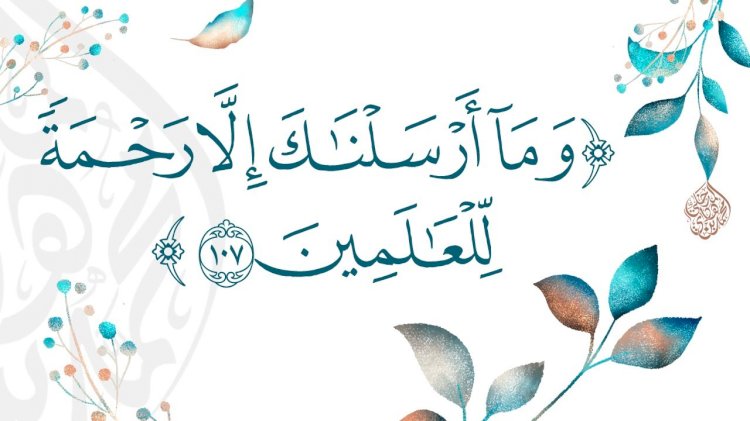
Raḥmat li al-ʿĀlamīn aspect of IIUM is more celebrated with its initiatives for community engagement.[8] In this regard, RCE Greater Gombak is a model initiative of IIUM, which is propounded to achieve ESD. RCE means Regional Centres of Expertise, and ESD means Education for Sustainable Development. RCE is a network of educational institutions, communities, governments, NGOs, business people, private sectors, which seriously work together to bring back the role of education for Sustainable Development (SD) and give solutions to the problems on the ground. RCE releases the universities from the conceptual, theoretical and classroom level engagement and to go forward to practical, reality-based and ground-level functioning. In other words, RCE works for implementing the global objectives to the local contexts of communities. It adopts the method of working together with people from multi-sectoral and interdisciplinary domains, encouraging innovation and fresh approaches. As a result, SDG-Society transforms as the agents of change in society at large. Through four ways, RCEs and universities can help each other in achieving the SDGs, which are (1) governance, (2) collaboration, (3) research and development and (4) transformative education.
RCE Greater Gombak is an award-winning initiative of IIUM, with the motto "Leading the Whole Community Transformation through Spirituality and Sejahtera". This project is for ensuring that the local community benefits from the presence of the university. This collective effort is for synergising the various stakeholders for the welfare of all the sections of society with the spirit of "leaving-no-one-behind". For spirituality and sustainability, it mainly deals with ethical, religious and foundational things in society. It focuses on creating balance and harmonious living. Diverse faiths will contribute to strengthening the spiritual foundation of indigenous communities. The Sejahtera aspect is for mainstreaming the indigenous values and local wisdom and incorporating them in global objectives. As a result, SDG gets more acceptable and adaptable to the local community, which will consequently help transform society.
The aspect of 'impact' and community engagement needs to be the governing principles in the research as well. In light of lessons taught by the Covid-19 pandemic, IIUM asks the researchers to turn their due focus on the areas that need quick attention for the survival of humanity after prioritising the necessities (ḍarūriyyāt). Ḍarūriyyāt refers to the top priority matters in maqāṣid al-sharīʿah, the philosophy of Islamic legislation. Maqāṣid represents the wisdom, insight, goals engrained in the rulings of Shariah. For IIUM, maqāṣid, i.e., the higher objectives of the Shariah, are deemed as dynamic and governing principles in its roadmap towards achieving the SDGs. The Covid-19 pandemic has exposed how unprepared we were for the impending natural disasters and pinpointed the need for reorientation in our academic and research endeavours. The focus should be on global collaboration, social responsibility and participatory leadership using the methods of multidisciplinary, interdisciplinary and transdisciplinary realms. Responsible Research and Innovation (RRI) reprograms our inclination towards an integrated ecosystem in order to ensure that the outcomes of researches are socially desirable, acceptable, merciful and leading for a sustainable change in the society, which affirms our orientation towards the implementation of Raḥmat li al-ʿĀlamīn. The need is for strategic and systematic integration of science, technology, religion, arts, humanities, indigenous knowledge with innovation, entrepreneurial and global mindset for adequately meeting the challenges of the 21st century. This rewiring ensures the earnest engagement of university with the community, and then it undoubtedly is a conscious footstep of fulfilling Raḥmat li al-ʿĀlamīn. The Prophet (ﷺ) said: “The best of people are those who are most beneficial to people.”[9]
IIUM is, literally and technically, the garden of knowledge and virtue, where Raḥmat li al-ʿĀlamīn inherently embodies the spring of soulful fragrance, gently touching every person who walks through it.
(Sayyed Mohamed Muhsin is an assistant professor of Islamic jurisprudence at International Islamic University (IIUM), Kuala Lumpur. He also serves as Editor-in-Chief of Islamonweb-English)
[1] Aḥmad bin Ḥanbal, Musnad al-Imām Aḥmad bin Ḥanbal (Cario: Mu’assasat Qurṭubā, 1433 AH), 2: 381.
[2] Mohd Kamal Hassan, KIRKHS FUTURE AGENDA, https://www.youtube.com/watch?v=CFt-c9mS_eo&list=LL&index=4
[3] Vision and Mission, https://www.iium.edu.my/office/odrail/vision-and-mission-10
[4] IIUM Anthem. https://www.youtube.com/watch?v=EvgXNzMHwrQ
[5] Dzulkifli Abdul Razak, "Let's Lead the Way", https://www.youtube.com/watch?v=Kb8aufpwgPM .
[6] IIUM Anthem. https://www.youtube.com/watch?v=EvgXNzMHwrQ
[7] Office of Knowledge for Change and Advancement (KCA), IIUM, Sejahtera Academic Framework : Humanising Education for Raḥmatan lil-ʿĀlamīn post-COVID-19 disruptions, page 19.
[8] KIRKHS Rahmatan Lil-"Alamin, https://www.youtube.com/watch?v=O-xmhIzSPQs
[9] Al-Ṭabrānī in al-Awsaṭ.
Disclaimer
The views expressed in this article are the author’s own and do not necessarily mirror Islamonweb’s editorial stance.
10 Comments
-

This article is an exact reflection of the main moto of IIUM, “Rahmatan lil Alamin”, written by Sayyed Mohamed Muhsin, Assistant Professor of the Department of Fiqh and Usul al Fiqh at International Islamic University Malaysia (IIUM). This article contains prophet’s embodiment of mercy on earth and its fields, along with an explanation of four fundamental ideas of the university: Khalifa, Amanah, Iqrah, and Rahmatan lil Alamin. Allah has sent us into the world as caliphs to carry out His Ubudiyah. And to guide the uncivilized mankind, he sent the Prophet s.a.w., whom Allah has identified as Rahmatan Lil Alamin in the Qur'an. And one of the main goals of the Prophet's dawah is to make every person of Ummah Rahmatan LilAlamin.The International Islamic University Malaysia has been established to develop every individual of the Ummah as Rahmatal Lil Alamin. In this article, the author, Dr. Sayyed Mohamed Muhsin, describes how IIUM is working with the Rahmatun Lil Alamin concept to produce a group of idealistic researchers and graduates dedicated to the welfare of mankind and the Muslim Ummah. In this paper, the author highlights how IIUM is working with the Rahmatun Lil Alamin concept to produce a group of idealistic researchers and graduates dedicated to the welfare of mankind. This article is an excellent contribution to explain the main objectives of IIUM.
-

as a muslim, we must always be grateful for the blessings of islam and faith bestowed on us since we were born. With these two blessings we can know how much God loves his servants. When we are faced with a problem, let us not be sad or afraid to face the problem because God is always with us. God never forgets or leaves us alone on this earth. We are the ones who always neglect and forget God and only return to him when adversity befalls us. So, ask anything of Him because God loves to hear the prayers of His beloved servants.
-

Students should learn and practise both knowledge and good manner(adab) in their daily live. Both are important to achive a good ummah. To get barakah in knowledge, they should practise the adab. Eventhough it is teachers job to teach the students, the students also must play their role in respecting the teacher.
-

yes.. I agreed.. indeed Rasulullah has left us with two things, which is Al-Quran and As-Sunnah to follow them and make them as our guidance, then we will not go to the wrong way. InsyaAllah if we learn and apply them in our lives, it will not harm anything or anyone.
-


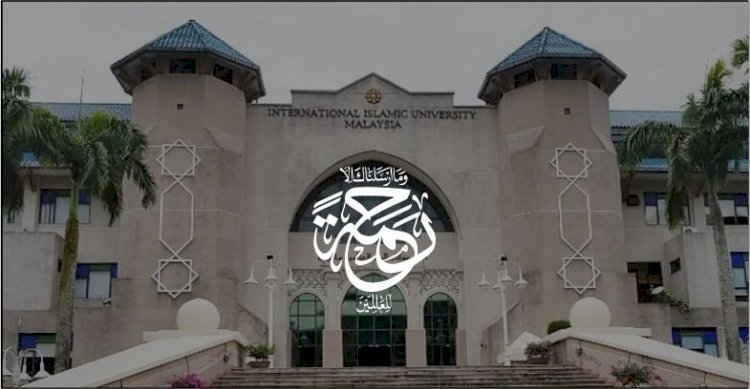


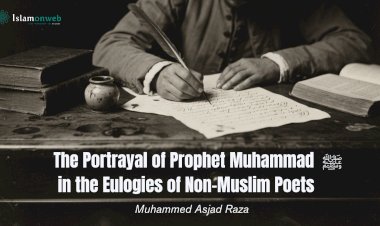
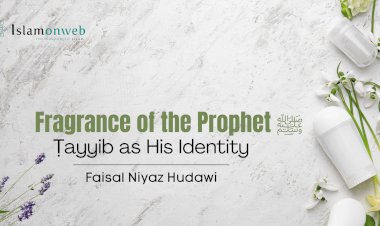
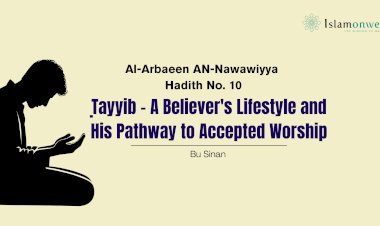
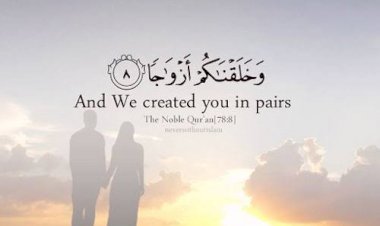
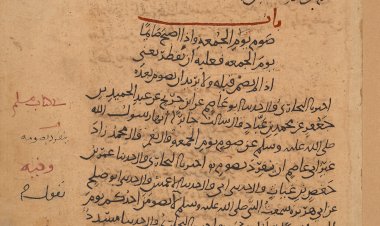
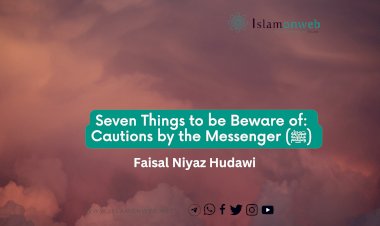














Leave A Comment